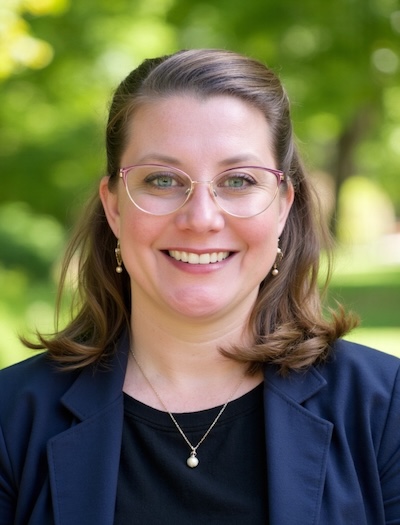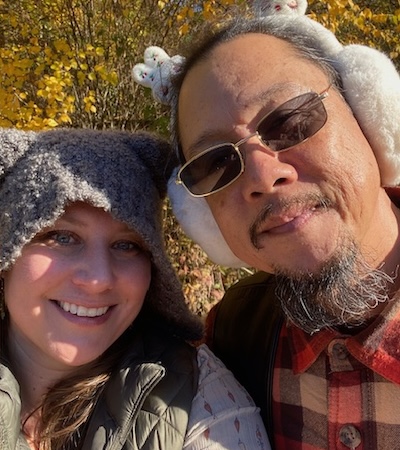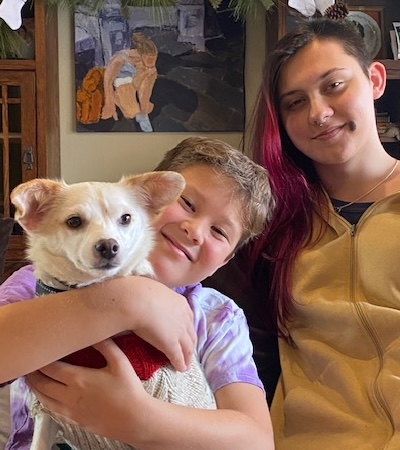
Faculty Spotlight: Allyson Troxel-Galang
 “When it comes to thinking about the work we do, I think if we're not willing to actually be in the mess with our clients, we're doing them a disservice,” shared Dr. Allyson Troxel-Galang, an adjunct faculty member and 2019 graduate of the Wright Institute’s Clinical Psychology program. “If we come in as complete experts, acting like we know everything, we’re going to miss things.” Dr. Troxel Galang’s passion is working with adults who have suffered from trauma and she recognizes that her clients are the experts in their own experiences.
“When it comes to thinking about the work we do, I think if we're not willing to actually be in the mess with our clients, we're doing them a disservice,” shared Dr. Allyson Troxel-Galang, an adjunct faculty member and 2019 graduate of the Wright Institute’s Clinical Psychology program. “If we come in as complete experts, acting like we know everything, we’re going to miss things.” Dr. Troxel Galang’s passion is working with adults who have suffered from trauma and she recognizes that her clients are the experts in their own experiences.
Dr. Troxel-Galang grew up in the midwest, born in Illinois and raised primarily in Missouri. Her parents met when they were both in the Army, but divorced when Dr. Troxel-Galang and her older sister were still very young. The sisters lived with their mother in Missouri during the school year and spent summers with their father, who lived in several states over the years. When Dr. Troxel-Galang was seventeen, her mother was transferred to Oakland, California. Although she loved living in California, it was very difficult for Dr. Troxel-Galang to change schools for her senior year of high school and she began acting out.
After high school, Dr. Troxel-Galang embarked on a journey of self-discovery. “My sister is academic and intellectual - that was her world and she was going to college,” she recalled. “The messaging in my home was that I was good with people, so I just didn’t see myself as academically inclined.” Instead of heading to college, she worked in restaurants and pursued her passion for painting. “I struggled a lot with figuring myself out, but I started really looking at life differently when I had my daughter,” she reflected. “When she started preschool, I started taking classes at Diablo Valley College (DVC).” Dr. Troxel-Galang is incredibly grateful for a mentor who pushed her to take that first step all those years ago, literally holding her hand along the way.
To complete her undergraduate studies, Dr. Troxel-Galang enrolled at University of California Berkeley. “I came in as a transfer student and student parent, but there’s amazing support there, which I really needed even as a nearly thirty-year-old,” she explained. “I made my path harder by being older and having different responsibilities, but I don't think I would have had the grit to show up and do all of that as a 20 year old.” Although she knew she wanted to pursue a career in psychology, Dr. Troxel-Galang chose to major in interdisciplinary studies with a focus on consciousness and human health in order to pursue other areas of interest. She graduated with her BA in 2013, a month after her second child was born.
In 2014, Dr. Troxel-Galang enrolled in the Wright Institute’s Clinical Psychology program. Despite having a nine-month-old at home, she was determined to keep the ball rolling and continue her education. Dr. Troxel-Galang was so grateful to find that there were a few other mothers in the cohort and they were able to bond and support one another. “What drew me to the Wright was their mission of ‘clinicians to society’ and then actually meeting the people in the community,” Dr. Troxel-Galang recalled. “I believe it’s important to value difference and the diverse paths people take and the Wright Institute felt like a place to support that.” During her admissions interview with Dr. Anatasia Kim, she felt so welcomed and supported because Dr. Kim made it clear that her life experiences prior to becoming a therapist were assets, not hindrances.
During her studies at the Wright Institute, there were a few professors who had a profound impact on Dr. Troxel-Galang. The first was Dr. Matthew McKay, who began as her Case Conference instructor and has evolved into a treasured friend and mentor. “When I was a first year, I remember thinking, ‘Who thought I belonged in this Case Conference?’” she laughed. “Now I’m so grateful because the type of mentorship I received from Dr. McKay was exactly what I needed, bringing structure to my warm and fuzzy approach.” Dr. Troxel-Galang is glad to now be Dr. McKay’s colleague, both at the Wright Institute and at Bay Area Trauma Recovery Clinical Services. The other two professors she formed a close relationship with were Dr. Becky Pizer and Dr. Leon Wann, who taught her Narrative Therapy course. “I would always pop in to talk to them and I really valued their support,” she reflected. “It’s such an honor to be their colleague now.”
From 2017-18, while still a student at the Wright Institute, Dr. Troxel-Galang took a job as a behavioral coach at East Bay Behavioral Therapy Center, working with clients of all ages with anxiety disorders and emotion dysregulation. She loved the work there, but that year was a challenging balancing act. “As a fourth year student, I was applying to internships and trying to really get my dissertation closer to done,” she recalled. “I was also trying to make time to be there for my youngest who was starting school and my oldest who was transitioning from middle school to high school - it was a tough time that year!” Thankfully she lived on the same street, so the commute was easy and she was able to push through. “It felt good to do the work and see how that felt in the community setting outside of practicum,” she reflected. “Even though it was a lot of stress, there was a great feeling of accomplishment - I was excited thinking of all the places I could go!”
For her doctoral internship, Dr. Troxel-Galang returned to Anka Behavioral Health’s Don Brown Shelter /in Antioch, CA, where she had completed her first year practicum. It was a full-circle experience, but she was able to work much more closely with the staff in her role as an intern and participate in program building. “Community mental health programs are hard because of the lack of organization and resources,” she explained, “but you have so much autonomy and freedom to actually get in there and look at the ways you can serve based on who you are and what you have to offer.” Dr. Troxel-Galang loved her time at Don Brown Shelter, even though it had changed since she did her first year practicum there. “It used to be more of a multi-service center where people could come and get services, take a bath, get a meal and find other resources,” she recalled. “It changed to be just residential, so only the folks who lived there received services there.” At first, she was a bit sad about this change, but it enabled her to build new therapy groups and provide other opportunities for the residents.
The title of Dr. Troxel-Galang’s doctoral dissertation was “The Efficacy of a Spiritual Acceptance and Commitment Therapy Protocol for Clinical Trauma Patients.” She knew that Dr. McKay had interests in spiritualism and trauma, so she sought his guidance about how she could study the impact of spiritual practices on post-traumatic growth. Dr. McKay suggested that she run a pilot study at the trauma clinic, so she took his advice and he became her dissertation chair. “I loved it because instead of just doing research, I actually got to run the groups and be in the middle of it,” Dr. Troxel-Galang reflected. “What we found was that these spiritual practices actually treated trauma, but not so much post-traumatic growth as that’s a much harder construct to measure.” She was thrilled to see, however, the clear reduction in trauma and PTSD symptoms.
After graduating from the Wright Institute, Dr. Troxel-Galang began working as a postdoctoral registered psychological assistant at San Francisco DBT Center. Her interest in DBT was sparked during her fourth year while working at East Bay Behavioral Therapy Center, so it was an easy choice to pursue more DBT training during her postdoc. Once she became a licensed psychologist in 2021, Dr. Troxel-Galang transitioned to the role of affiliated therapist and still practices and leads a weekly group there today. “I love groups, primarily because they allow people to learn from one another and feel less alone in their struggles,” she explained. “It's really magical to see a group function in a way that allows people to not only support each other but access a layer of their own wisdom that just doesn't come out the same way in individual therapy.” Dr. Troxel-Galang has an additional caseload of about 10-12 patients, so her plate is always full.
 Since 2021, Dr. Troxel-Galang has been practicing yoga and learning somatic practices for trauma work. Initially, she was opposed to the idea of taking yoga classes, but with the encouragement of her therapist, she signed up for a 10-week program. Unsurprisingly, she hated it at first. “I would get on the mat and just start immediately bawling - all the stuff was coming up and coming out,” she recalled. “As much as I hated that, I felt like it was moving me way further than anything I was doing in therapy.” When Dr. Troxel-Galang finished the 10-week program, her therapist encouraged her to take it again, and she’s been doing yoga ever since. “It helps me come back to myself and be a little bit more grounded in what's coming up for me and what's mine and what I'm holding for somebody else,” she explained. “That relationship feels more cultivated when I continue those practices.”
Since 2021, Dr. Troxel-Galang has been practicing yoga and learning somatic practices for trauma work. Initially, she was opposed to the idea of taking yoga classes, but with the encouragement of her therapist, she signed up for a 10-week program. Unsurprisingly, she hated it at first. “I would get on the mat and just start immediately bawling - all the stuff was coming up and coming out,” she recalled. “As much as I hated that, I felt like it was moving me way further than anything I was doing in therapy.” When Dr. Troxel-Galang finished the 10-week program, her therapist encouraged her to take it again, and she’s been doing yoga ever since. “It helps me come back to myself and be a little bit more grounded in what's coming up for me and what's mine and what I'm holding for somebody else,” she explained. “That relationship feels more cultivated when I continue those practices.”
Dr. Troxel-Galang returned to the Wright Institute's Clinical Psychology program in the fall of 2022 as an adjunct faculty member. Community is very important to her, so she was excited to return to her alma mater with the opportunity to give back and share her knowledge with current students. “I truly try to see everybody as they are - I look at the students and I see both their struggles and the potential that they don't see yet,” Dr. Troxel-Galang reflected. “I try to find the light in each person, see where they can be pushed, and plant those little seeds.” Her favorite moments as a teacher have been those “lightbulb moments” where something difficult finally clicks for a student. “When you teach, you also see the holes in your own knowledge base, so it keeps me fresh,” she admitted. “I’ve learned so much from students - that's a huge value and it enriches my work.” Dr. Troxel-Galang has found that not only do her students like to hear examples from her work, but her clients also like to hear about what her students are researching and where the field is heading.
So far, Dr. Troxel-Galang has taught Advanced Clinical Seminar, Intervention: Cognitive Behavioral Therapy, and Trauma and Recovery. She has enjoyed teaching each course, but Trauma and Recovery has been her favorite, both because of her passion for the topic and the flexibility of it being an elective course. “I get to bring in topics that I’m interested in, but there are so many more voices in the field of treating trauma that need to be added,” she explained. “I wish it was a year-long course with different professors or a team teaching - that would make my heart big and happy!” Looking forward, she hopes to continue teaching at the Wright Institute and is particularly interested in teaching more electives that align with her areas of specialty.
When asked what advice she had for current or prospective students, Dr. Troxel-Galang’s message was clear: “Don’t focus on ‘getting it right.’” She encourages students to worry less about passing their classes and more about their personal growth. “Show up and be yourself and strive to understand how you think and feel about what you're learning and doing,” she suggested. “This field is a synthesis of our heart and head - we have to find the feelings and then give them structure and form.” Given this amazing advice, it’s no surprise that her mentorship of students and supervisees is the work that Dr. Troxel-Galang is most proud of thus far. “I believe staying in the difficult moments and giving opportunities for people to feel out their unique voices and contributions is something I can do and have been able to do over the past few years,” she reflected. “I hope to always stay in touch with this part of my work as a psychologist.”
 Outside of her work, Dr. Troxel-Galang’s life is very full. “I think I’m struggling more with balance now than I was as a student,” she laughed. Thankfully, she has a very supportive partner who has stuck with her for the last twenty-three years, through the challenges of parenthood, schooling, and establishing a career. “It certainly wasn't easy on my family to have me pulled in so many directions for so long, and there were nights I would come home after 12-15 hours of school/work and be handed a baby, but also a warm plate of food,” she recalled. “I know that I couldn't have made it to where I am without that steady support and the commitment to allow me to follow this path that I didn't even know I wanted when we met.” Her youngest child still lives at home and Dr. Troxel-Galang can often be found on the baseball or soccer field on weekends. She also enjoys crocheting and embroidering, and although she describes her work as “more crafty than artsy,” she finds it very relaxing. “One of my greatest joys in life is my dog, Princess Casper, a chihuahua I rescued from the shelter in 2023 or 2024,” she shared. “She is just a delight, so I'm always out walking her and watching her happily sniff everything in the world.” Dr. Troxel-Galang also enjoys taking yoga classes and having regular ladies’ nights out with her friends.
Outside of her work, Dr. Troxel-Galang’s life is very full. “I think I’m struggling more with balance now than I was as a student,” she laughed. Thankfully, she has a very supportive partner who has stuck with her for the last twenty-three years, through the challenges of parenthood, schooling, and establishing a career. “It certainly wasn't easy on my family to have me pulled in so many directions for so long, and there were nights I would come home after 12-15 hours of school/work and be handed a baby, but also a warm plate of food,” she recalled. “I know that I couldn't have made it to where I am without that steady support and the commitment to allow me to follow this path that I didn't even know I wanted when we met.” Her youngest child still lives at home and Dr. Troxel-Galang can often be found on the baseball or soccer field on weekends. She also enjoys crocheting and embroidering, and although she describes her work as “more crafty than artsy,” she finds it very relaxing. “One of my greatest joys in life is my dog, Princess Casper, a chihuahua I rescued from the shelter in 2023 or 2024,” she shared. “She is just a delight, so I'm always out walking her and watching her happily sniff everything in the world.” Dr. Troxel-Galang also enjoys taking yoga classes and having regular ladies’ nights out with her friends.
In the next few years, Dr. Troxel-Galang hopes to continue in her current roles and keep learning and growing. She encourages members of the Wright Institute community to reach out as she truly values the connection, especially in times of turmoil. In the longer term, she hopes to one day start her own training program. “A lot of folks in my personal life are musicians and artists and I know deeply the profound and positive impact that expressive work can have,” she explained. “My ultimate dream is to one day open a center that provides combined opportunities for art exploration and therapeutic work.” Although it’s still just a dream and at least a decade down the road and the details are still forming, working towards this dream has been a through line for Dr. Troxel-Galang over the years.
